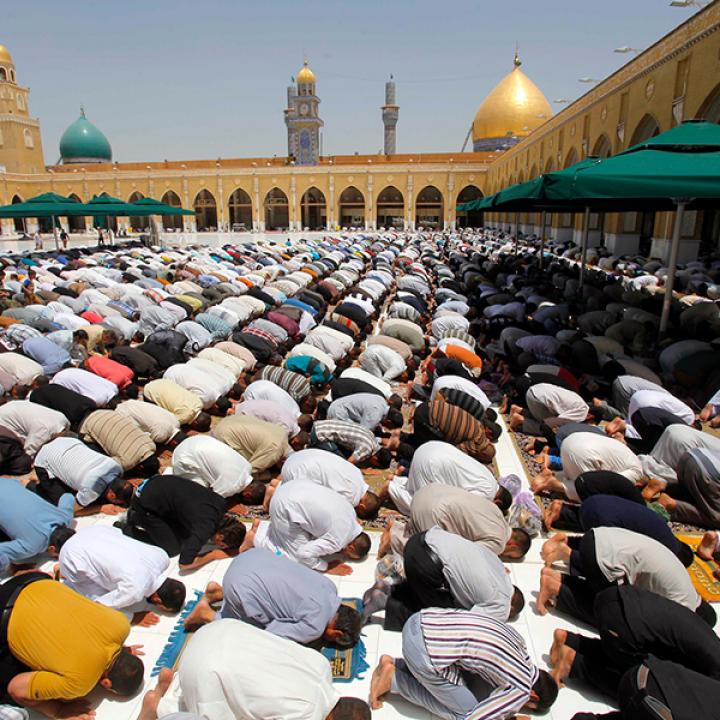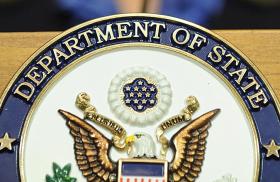
- Policy Analysis
- Fikra Forum
The Religious Dimension of Iraq’s Coronavirus Response

Even in relatively secular countries such as Germany, religion has played an important role in the public’s ability to grapple with the coronavirus pandemic—especially through religious practices like public prayer. However, countries where the role of religious leaders and followers is far more complicated and vital face additional challenges in their ability to enforce life saving measures. This has become evident in countries such as Iraq, where religion has played an increasingly influential role in the government’s ability to limit the spread of the disease.
Iraq has witnessed an increasing number of confirmed cases since mid-March, which has widely been attributed to the country’s poor health services. Though further examination of the country’s complicated religious mosaic reveal how religion has played a more influential role in its ability to enforce various lock-down measures. Iraq struggled to effectively enforce such measures because of considerable resistance from the public—mainly concerning the government’s mandatory curfew. The government attempted to impose a curfew on March 17, where violators could face fines and even arrest. However, the government announced the easing of lockdown hours during the month of Ramadan to take place between 7 PM to 6 AM instead of 24 hours. For Iraq, religious leaders have played conflicting roles in shaping the government’s response to the public health crisis by either reinforcing or challenging the government’s efforts.
The first role that religious leaders have played is in cultivating compliance. These leaders’ followers mainly consist of Iraqis who have complied with the curfew as a response to the commands of religious leaders, such as the Shia Grand Ayatollah Sistani. To keep much of the public at home and encourage those who work in the health sector to continue providing services to combat coronavirus, Sistani issued a fatwa, or a ruling on Islamic law, that has had a major impact on people’s attitudes towards both issues. More importantly, Sistani’s influence has allowed the government to avoid a serious predicament—a major confrontation with those of the public who do not follow “secular” commands. Iraqi officials, including the Ministry of Health, have explicitly referenced Sistani’s fatwa in their statements to motivate the public to comply. In this case, observing Iraq’s stay-home orders reflect followers’ respect for the commands of those religious leaders, highlighting that coronavirus has become a religious as well as a public health issue. If religious leaders such as Sistani had not given their fatwa, the Iraqi government would have found added difficulty in enforcing a curfew.
The second role that religious leaders have played is in promoting resistance. Many of these leaders discouraged compliance with the curfew because they did not believe in the existence of the virus or that they did not see it as harmful. For example, Qassim Altai, as a religious leader and a supporter of Muqtada Alsadr, stated that the Muslim believers cannot be infected by coronavirus. During a public gathering, another religious leader motivated people to keep performing religious ceremonies and rituals as usual. These claims are further bolstered by some Iraqi political leaders’ responses. Political leaders have continuously downplayed the lethality of the virus and fueled the conspiracy theory that the United States spread the virus to target the Muslim countries. This form of religious influence has presented numerous challenges for the Iraqi government. As the outbreak worsened, Iraq struggled to find the balance between confronting religious leaders and their followers that violated the curfew while at the same time managing concerns about freedom of religion. To ease public anxiety affiliated with whether the curfew infringed upon religious rights, the government unenthusiastically executed the nationwide curfew and leaned on Iraq’s most influential religious leaders for support.
The Iraqi government’s failure to discourage the annual Shia pilgrimage to the shrine of Imam Kadhim in Baghdad further illustrates the Shia-led government’s halfhearted enforcement of a curfew as a way to appease religious leaders. As part of the preparations for the visit, Iraqi Minister of Health Jafar Alawi met with Hussain Alsader—a famous religious leader in Baghdad—to ask for Alsader’s cooperation. During that visit, Hussein Alsadr expressed support for the government’s effort to contain coronavirus. However, their meeting did little to discourage public participation in the annual shrine visit. On March 21, thousands of pilgrims marched towards Baghdad in defiance of the government’s warnings. In many cases, pilgrims ignored security checkpoints as they tried to stop the flow of people. Iraq's inability to prevent the pilgrimage forced the Minister of Health to publicly call on Muqtada Alsadr—one of the most powerful Shia political and religious leaders—to release a statement informing visitors of the shrine to quarantine for 14 days because the public would listen to Alsadr more than the Health Minister.
The controversy over the closure of the shrines was also seen as an opportunity for many religious leaders to boost their popularity among the Shia majority. A bold public challenge to the state’s authority might have provided more backing to religious leaders, but most took the more “moderate” approach of only objecting to only the closure of the shrines. Muqtada Alsadr’s tweets serve as a prime example. He clarified his objection, stating, “I did not object to the curfew, nor did I violate the health and organizational measures...Our objection was to the closure of the shrines only.” The fact that thousands descended upon the shrines despite government orders shows the influence religious leaders can have over the populace.
Turning to religious leaders’ influence over Iraq’s Sunni minority, the Council of Senior Scholars—a Sunni religious institution—stated in February that in the case of a mandatory curfew, people should not pray at mosques. The Council’s statement also prohibited public gatherings at markets and schools. Additionally, on March 16, the Sunni Endowment declared that all mosques in Iraq would be closed, encouraging people to pray at home. While Shia religious leaders’ initial orders were unclear, Sunni leaders’ instructions to stay home have helped the government exert its power in implementing the curfew among the Sunni population.
Religious Iraqis often seek the advice of religious leaders on public issues, increasing their influence over their followers and consequently the entire society. According to an Arab Barometer survey, the percentage of Iraqis who defined themselves as religious increased from 39% in 2013 to 50% in 2019. While a relatively high percentage of Iraqis still define themselves as religious, the October 2019 protests reflected different levels of religiosity as protesters took to the streets to chant, “No to religion or sect.” The Iraqi Security forces brutal clampdown on protestors versus its lackadaisical approach to implementing a curfew has outraged many activists and presented government actions as hypocritical.
While it is difficult to assess whether imposing restrictions on the religious ceremonies threatened the government’s legitimacy, one must acknowledge that Iraq’s religious leaders’ approval—or rejection—weighed heavily in its ability to enforce a nationwide curfew. And after the spread of the virus among pilgrims of Imam Kadhim, the public began to recognize that restrictions are for public safety and not a violation of religious freedom. Regardless of this understanding, religion remains the motivating factor behind the public’s participation in government directives—particularly among Shia. If the government does not consult with influential religious leaders, it risks losing the support of religious Iraqis—who make up a sizable proportion of its population.


